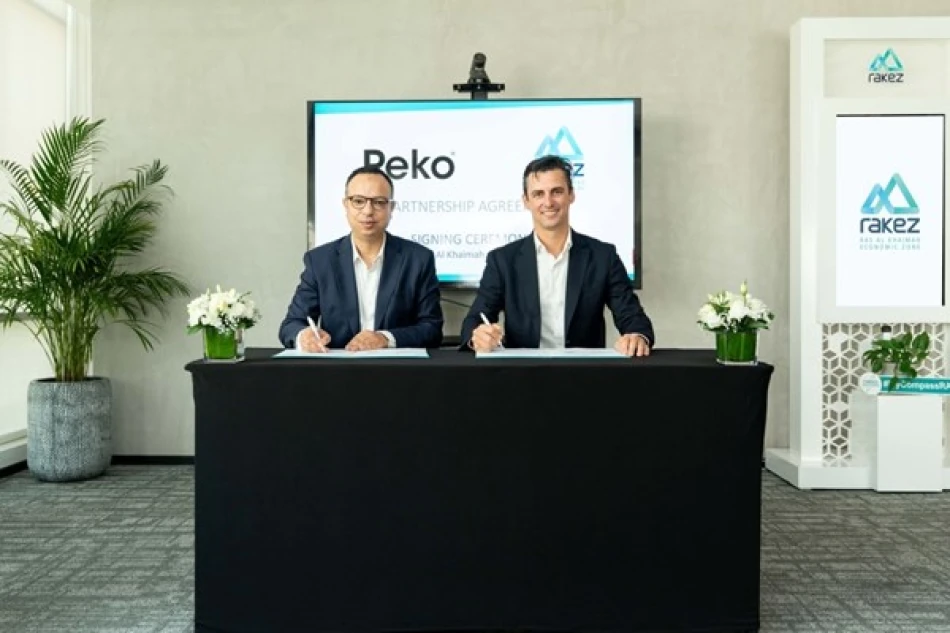
Rakez and Beko Collaborate to Streamline Small and Medium Enterprises Operations
UAE's Ras Al Khaimah Targets SME Digital Revolution with Strategic Fintech Partnership
The Ras Al Khaimah Economic Zones Authority (RAKEZ) has forged a strategic alliance with UAE-based fintech company Pico to deliver automated business solutions directly through its digital platform. This partnership represents a significant shift toward making enterprise-grade financial tools accessible to small and medium enterprises, potentially reshaping how SMEs operate in one of the UAE's fastest-growing economic zones.
Automated Solutions Bridge the SME Technology Gap
The collaboration integrates Pico's automation-driven financial technology into RAKEZ's existing digital services portal, offering businesses streamlined access to invoice generation, payroll management, utility bill payments, and corporate travel bookings. The partnership was formalized through a memorandum of understanding signed by Pico's founder and CEO Kashif Khan and RAKEZ's Head of Customer Experience Ian Hunt at the Compass Business Center.
This move addresses a critical pain point for SMEs operating in free zones, where administrative complexity often diverts resources from core business activities. By embedding these tools within RAKEZ's platform, companies can now access sophisticated financial management capabilities without investing in separate software solutions or extensive IT infrastructure.
Strategic Positioning in the UAE's Economic Diversification
Competing with Dubai and Abu Dhabi
The partnership positions Ras Al Khaimah as a technology-forward alternative to the UAE's more established business hubs. While Dubai and Abu Dhabi have dominated the fintech landscape, RAKEZ's integrated approach to SME services could attract businesses seeking comprehensive support rather than fragmented solutions across multiple providers.
This strategy mirrors Singapore's approach to economic zone management, where integrated digital services have become a key differentiator in attracting international businesses. The UAE's northern emirates are increasingly leveraging technology partnerships to compete with their southern counterparts for foreign investment and business registrations.
Market Implications for Regional Fintech
For fintech companies operating in the Gulf region, this partnership model suggests a shift toward B2B2C strategies rather than direct consumer acquisition. Pico's integration with RAKEZ provides immediate access to thousands of registered businesses, offering a more efficient scaling path than traditional marketing approaches.
The collaboration also signals growing demand for embedded finance solutions in the Middle East, following trends seen in markets like Brazil and India where fintech integration with business service providers has driven significant growth.
Operational Impact and Business Value
According to Kashif Khan, the partnership aims to "establish new standards for how SMEs operate, grow, and thrive within the modern economy." The focus on real-time dashboards and automated reporting addresses compliance requirements that often burden smaller businesses with disproportionate administrative costs.
RAKEZ CEO Rami Jallad emphasized that the authority is positioning itself as "a genuine partner in daily operations management" rather than merely a business setup facilitator. This evolution reflects broader changes in how free zones compete, moving beyond tax advantages toward comprehensive business ecosystems.
Broader Regional Context
The timing of this partnership aligns with the UAE's broader digital transformation initiatives and its goal to become a global fintech hub by 2030. Recent regulatory developments, including the Virtual Asset Regulatory Authority's framework and the Central Bank's open banking initiatives, have created favorable conditions for fintech innovation.
Similar integrated approaches have proven successful in other emerging markets. Estonia's e-Residency program and Rwanda's digital government initiatives demonstrate how technology integration can accelerate business formation and economic growth. RAKEZ's model could serve as a template for other UAE emirates and regional economic zones seeking to enhance their competitive positioning.
The partnership's success will likely depend on adoption rates among existing RAKEZ clients and its ability to attract new businesses specifically seeking integrated digital solutions. Early indicators suggest strong market demand, with SME digitization accelerating across the Gulf region following pandemic-driven operational changes.
Most Viewed News

 Layla Al Mansoori
Layla Al Mansoori






